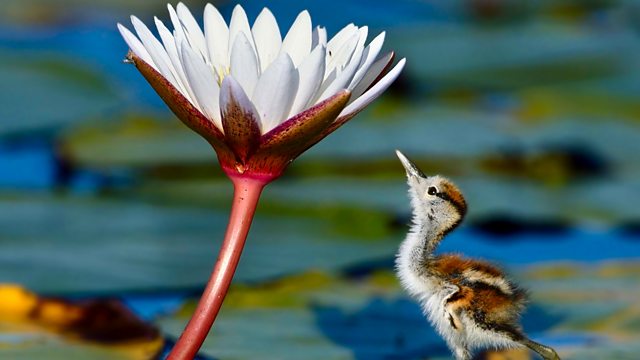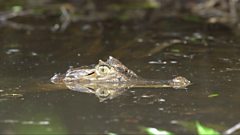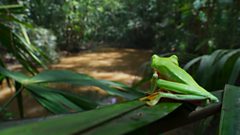Freshwater
Fresh water is the lifeblood of planet Earth, where incredible animal dramas play out. From death-feigning fish to frogs that glide, each depends on fresh water for their survival.
Fresh water is the lifeblood of planet Earth and the stage for extraordinary animal dramas.
In the heart of the Costa Rican rainforest, a little-known spectacle unfolds above a very special pond. Up to ten thousand gliding tree frogs – the world’s largest known gathering of its kind – descend from the canopy for the most important breeding event of the year. It will only last a day, and with males outnumbering females nine to one, competition is fierce. This is a party you don’t want to be late for.
Meanwhile, in Sri Lanka, as the dry season reaches its peak, the last remaining waterhole for miles around becomes a magnet for a different animal: mugger crocodiles. Giants up to five metres long lurk beneath the surface, waiting patiently for thirsty chital deer to approach the waterhole for a drink. But catching their prey is no easy feat and requires them to do something extraordinary. Documented nowhere else, these crafty crocodiles have learned how to exploit their prey’s need for fresh water - by creating traps.
Nestled amongst flowering water lilies, newly hatched ‘lily-trotter’ chicks learn a vital lesson – how to ‘walk on water’. Their oversized feet - almost double the length of their body – make for a wobbly start, but their dedicated father will do whatever it takes to keep them safe during the most vulnerable stage of their life.
One of the biggest challenges of living in a freshwater world is its dynamic nature. It can appear, vanish or transform rapidly. Survival in these dynamic environments hinges on adaptation. In the Okavango Delta, the arrival of the great annual flood poses a significant challenge for a pack of five African wild dogs. On dry land, they are one of the continent’s most successful hunters, but as their hunting grounds turn to swamp, they must find an innovative way to master this water world.
Meanwhile, millions of goby fish on the remote volcanic island of Bioko prepare for a perilous journey. After months feeding out at sea, they return to fresh water to breed. The safest place to lay their eggs is where ocean predators can’t follow – at the very top of a 30m waterfall. Surely an impossible journey for a fish only an inch long, and one that will require a bizarre physical transformation.
In a few rare places, like Lake Malawi, fresh water has remained a consistent presence for millions of years, resulting in a dazzling diversity of life. Here, over a thousand unique fish species thrive - more than any other lake on earth, but competition in these crowded waters is intense. To survive here takes ingenuity. Meet Nimbochromis livingstonii - a master of deception that tricks other fish into thinking it's dead.
Fresh water is vital to life, yet it is a finite resource. Of all the water on earth, only 2.5 per cent is fresh and most of that is locked up as ice or hidden deep below ground. In fact, less than one per cent of fresh water is accessible.
Humans rely on fresh water for drinking, agriculture, irrigation, industry and power. Throughout history, we have devised extraordinary means to ensure it is always available for every demand, fostering the dangerous illusion that it is infinitely abundant. Yet today, two-thirds of our world’s great rivers no longer reach the sea, and in the last 50 years, freshwater species have seen an 83 per cent decline globally – a faster decline than that of species in any other habitat.
One animal suffering on the front line is the Indus river dolphin in Pakistan. This species is the most endangered freshwater dolphin globally, with only around two thousand individuals remaining. Every year, these dolphins get trapped in the network of irrigation canals which form part of the vast Indus Basin irrigation system – the largest such system on earth. These canals divert water from the Indus River to irrigate crops. As water levels drop due to agricultural demands, the dolphins become stranded in ever-shrinking pools, often hundreds of kilometres away from the main river. Their only hope for survival depends on the efforts of a dedicated rescue team, working to return them back to the river before it’s too late.
Last on
More episodes
Previous
Next
![]()
In pictures: Freshwater
Find out what's in store for the Freshwater episode
![]()
How much do you know about the Freshwater episode?
Test your knowledge with C�鶹��
Clips
-
![]()
Making Planet Earth III: "Where's the caiman?"
Duration: 03:01
-
![]()
The fish that plays possum
Duration: 01:34
-
![]()
Navigating the chaos of a tree frog breeding frenzy
Duration: 02:27
-
![]()
Indus river dolphin rescue
Duration: 02:57
Credits
| Role | Contributor |
|---|---|
| Presenter | David Attenborough |
| Production Manager | Bronwen Thomas |
| Executive Producer | Michael Gunton |
| Series Producer | Matt Brandon |
| Series Producer | Jonny Keeling |
| Producer | Charlotte Bostock |
| Producer | Nick Easton |
Explore different habitats and make origami animals, or download the poster 'Our Changing World' from The Open University
Visit The Open University website to learn about fascinating animals in their habitats.







